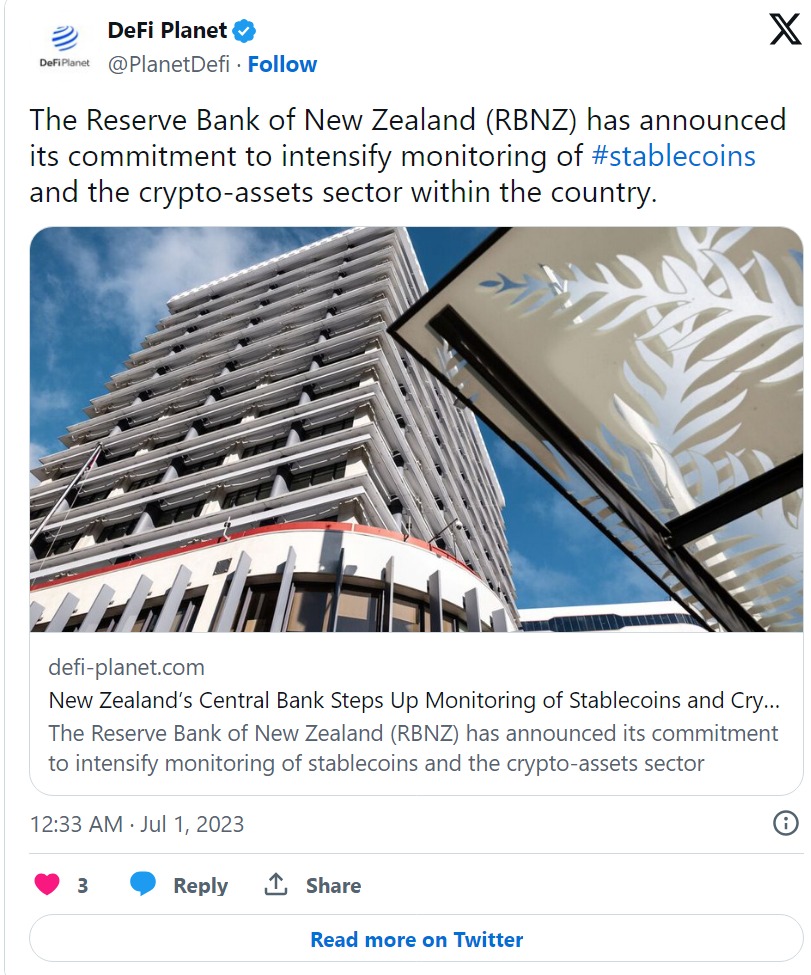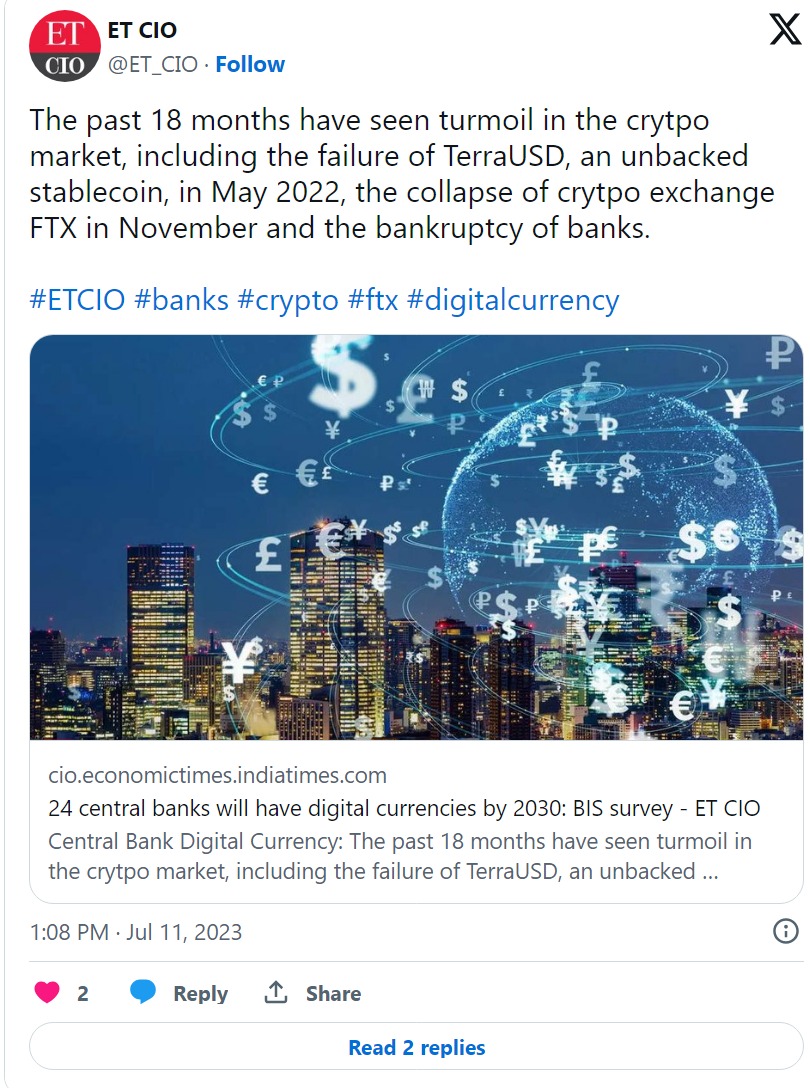[ad_1]
New Zealand’s central financial institution is getting ready for a future that features the mainstream use of cryptocurrency.
On the finish of final yr, the Reserve Financial institution of New Zealand (RBNZ) revealed an points paper, Personal Innovation: Te Auahatanga, on digital currencies. The paper sparked a wide-ranging dialogue on the event of the cryptoasset market and the way to reply to the challenges it presents.
The RBNZ acquired 50 submissions on its paper, with session ending in April. A abstract of the submissions was not too long ago revealed.
We took a take a look at the important thing issues held by those that participated within the session and what these issues may imply for the uptake of cryptocurrencies in New Zealand.
The way forward for cash in NZ
The RBNZ has mapped out a close to future the place companies may settle for digital currencies for funds, decreasing foreign money conversion points for worldwide clients. Cryptocurrencies may be used to streamline funds to suppliers or workers, notably these primarily based abroad.
And by leveraging the transparency of blockchain, companies may enhance belief by effectively monitoring transactions and provide chains.
However companies might want to enhance their safety measures to guard in opposition to on-line threats in addition to handle the potential market volatility related to cryptocurrencies.
Whereas outlining a path for cryptocurrencies, the RBNZ famous the challenges of regulating organisations which might be totally digital and decentralised. The financial institution additionally raised the query of how New Zealand’s current guidelines on cash laundering and the financing of terrorism would apply to cryptocurrencies.


The important thing hurdles for cryptocurrency
5 key themes emerged out of the submissions acquired by the RBNZ. These core themes highlighted the issues held by regulators, companies and on a regular basis New Zealanders.
- A transparent however versatile regulatory framework
Analysis on different markets has proven that laws can’t be static. The foundations must evolve with the know-how. That mentioned, laws must initially be fairly prescriptive.
The New Zealand Monetary Markets Authority (NZFMA) may set up a regulatory “sandbox” for cryptoassets, permitting companies to check their crypto-related applied sciences in a managed setting underneath shut supervision. This might encourage innovation in addition to assist form efficient laws, balancing the expansion of the sector with threat administration and client safety.
The NZFMA may additionally demand that New Zealand residents transact their cryptoassets by way of exchanges which might be primarily based in New Zealand and thus underneath the nation’s laws as a way to develop belief. These will be relaxed as soon as the market matures.
- Info and accessibility
The submissions additionally highlighted the necessity for clear, correct and accessible data on cryptocurrencies. Some respondents expressed concern concerning the normal lack of awareness about cryptocurrencies and the way they work.
The lesson from the collapse of the digital buying and selling platform FTX is that New Zealand traders must be protected, or at the least made conscious of, the dangers of transactions by way of exchanges in additional lenient jurisdictions.
Threat and alternatives had been additionally factors of debate. Respondents to the RBNZ paper acknowledged the dangers related to cryptocurrencies, resembling monetary crime and the danger to the broader monetary system.
On the similar time, they noticed a big alternative to reinforce competitors and additional innovation in New Zealand.
Respondents supported the RBNZ’s proposed monitoring method which underscored a “same-risk, same-regulation” precept. This holds that if a cryptoasset presents comparable dangers to an current monetary product, it needs to be regulated in the same method.
This suggests a versatile regulatory stance that evolves primarily based on the danger profile of the asset, thereby creating a good and balanced regulatory setting for all monetary devices, conventional or digital.
The RBNZ has proposed working carefully with worldwide regulators and personal sector data suppliers – firms or organisations that present knowledge, evaluation and insights concerning the crypto market. This might embrace blockchain analytics companies, crypto change platforms, analysis establishments and monetary know-how firms.
Our personal earlier analysis helps the idea that exterior laws will not be sufficient. It’s important that monetary intermediaries dealing in cryptoassets develop a company tradition of “efficiency with integrity”, one by which every member of the organisation is centred on the most effective curiosity of the consumer.
We have to monitor cryptoasset companies and guarantee they’ve strong company governance. One other lesson from the FTX failure is that exchanges themselves can’t be custodians of shoppers’ belongings – this should be completed by regulated third social gathering establishments.


Stablecoins, a sort of cryptocurrency with worth pegged to fiat currencies (a government-issued foreign money that isn’t backed by a commodity resembling gold) or gold, drew curiosity throughout consultations. Individuals noticed their stability as helpful. Stablecoins had been seen as combining the advantages of cryptocurrencies with the soundness of conventional currencies.
Nonetheless, it should be famous that stablecoins differ in threat publicity in response to the collateral they use; the crash of the Terra stablecoin in Might 2022 versus the resilience of Tether is testomony to this. Laws should be very clear on the reserve belongings demanded, and market supervisors should monitor these reserves very carefully.
The long run is digital
Though promising, the way forward for cryptocurrency in New Zealand isn’t with out its challenges. The RBNZ might want to preserve a detailed eye on issues. The central financial institution might want to stroll a wonderful line between encouraging new concepts and managing the dangers.
For the second, the RBNZ is taking a cautious method. Whereas there received’t be any instant coverage modifications, the RBNZ shall be enhancing its monitoring of the monetary ecosystem, monitoring international regulatory developments and collaborating with monetary organisations to handle knowledge gaps.
The purpose needs to be to verify folks perceive cryptocurrencies, handle the dangers and promote innovation. As one respondent put it:
“The long run is digital. Let’s embrace it, perceive it, and make it work for us.”
This text was initially revealed in The Dialog on 24 July 2023. It may be accessed right here: https://theconversation.com/the-future-of-money-is-digital-but-nz-needs-a-careful-framework-to-prevent-the-pitfalls-of-cryptocurrency-209025
In regards to the Authors
Abhishek Mukherjee gained his PhD from the College of Waikato in 2017 with a thesis titled ‘Mandated CSR expenditure: the Indian expertise.’ He has an MBA from India and a Postgraduate Diploma in Finance from New Zealand. Dr Mukherjee’s present analysis focuses on the small enterprise financing gaps. His analysis goals to analyse the present and potential enterprise capital sector for early-stage inexperienced applied sciences.
Paresha Sinha is an Affiliate Professor within the Faculty of Administration and Advertising, Waikato Administration Faculty, College of Waikato, New Zealand. She obtained her Ph.D. in Administration from the Victoria College of Wellington, New Zealand. She teaches Worldwide Administration and Innovation and Worth creation, in addition to supervises various doctoral college students who’re researching these points in rising markets.
Paul David Richard Griffiths spent a few years in management positions at international administration consulting companies, serving Boards of blue-chip firms, notably within the monetary providers sector. He specialises in company governance, administration of intangible belongings resembling mental capital, banking and Fintech. He helps organisations and trade sectors arrange information networks on technological platforms resembling augmented actuality, cognitive computing and blockchain.
Disclaimer: This text comprises sponsored advertising and marketing content material. It’s supposed for promotional functions and shouldn’t be thought-about as an endorsement or advice by our web site. Readers are inspired to conduct their very own analysis and train their very own judgment earlier than making any choices primarily based on the data offered on this article.
[ad_2]


